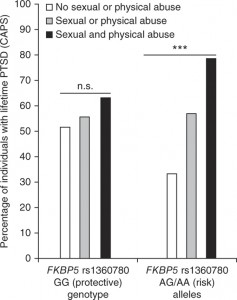This graph, from a recent paper in Nature Neuroscience, describes how variations in the gene FKBP5 make individuals more susceptible to physical and sexual abuse, and thus more likely to develop PTSD (post-traumatic stress disorder).
The paper is the result of a collaboration between Elisabeth Binder and her colleagues at the Max Planck Institute of Psychiatry in Munich, and Emory psychiatrists Kerry Ressler and Bekh Bradley. The population under study is made up of inner-city Atlanta residents, part of the Grady Trauma Project overseen by Ressler and Bradley. This paper analyzes samples from a group of individuals that is more than twice as large as the original 2008 paper defining the effect of FKBP5, and adds mechanistic understanding: how regulation of the FKBP5 gene is perturbed.
Back to the graph — in addition to the effects of the different forms of the gene, it is striking how high the rate of PTSD is for both individuals with the protective and risk forms of FKBP5. Also, for individuals who did not experience abuse, the PTSD rate is actually higher for the “protective†form of the gene. On this point, the authors write:
It is, however, possible that the described polymorphisms Gafas Ray Ban outlet define not only risk versus resilience, but possibly environmentally reactive versus less reactive individuals. This would imply that the so-called risk-allele carriers may also profit more from positive environmental change.
The FKBP5 gene encodes a protein that regulates responses to the stress hormone cortisol. Thus, it acts in blood and immune system cells, not only the brain, and is involved in terminating the stress response after the end of a threat. In the paper’s discussion, the authors propose that FKBP5 may have a role in sensitivity to other immune and metabolic diseases, in addition to PTSD and depression.
Max Planck press release on Binder paper
Recent post on Shannon Gourley’s related work (how stress hormone exposure leads to depression)




